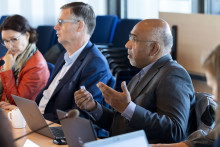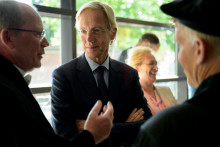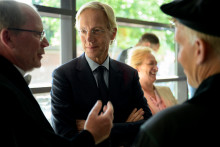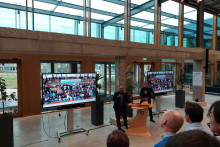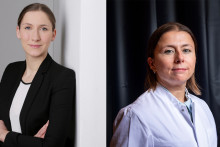The long-awaited letter from education minister Dijkgraaf about internationalisation will probably be published after the Ministrial Council this Friday. President of the Executive Board Vinod Subramaniam voiced this expectation during the University Council. The letter is a response to the political discussion that flared up at the end of last year. Several MPs argue for a restriction on the influx of international students and a return to Dutch for all Bachelor’s programmes.
Keeping a balance
During the University Council, Subramaniam gave an update on the state of affairs. The tone of his monologue made it clear that this is serious business for the UT, where many programmes are offered in English and a large proportion of staff and students now come from abroad. ‘It is clear that the parliament wants stricter enforcement of the language legislation for higher education. They also believes that the exceptions to the law are now being applied too loosely.'
Subramaniam has been situated close to the action in recent months. He took part in a working group with three other board members from Dutch universities, in which he spoke about internationalisation with the minister last week. ‘We had a positive discussion with him, but the minister has to keep a balance between his own vision and that of parliament. That clashes sometimes. Dijkgraaf recognises that internationalisation is an important part of our educational system, but at the same time, he emphasises that unbridled growth is not sustainable. He is also concerned about the accessibility and quality of education. In short, there is a search for balance.’
The exact content of the letter is not yet known to the president of the Executive Board, he will have to wait until Friday afternoon for that. Subramaniam does expect a tightening of the current policy, also based on new laws. According to the president, the UT endorses the importance of accessibility: the university wants to be an inclusive environment, both for international and Dutch students and employees. That is why the UT is scrutinising its own policy.
Bilingual
The president was already preparing for possible adjustments to promote inclusiveness. ‘We opted for English as the language of instruction a few years ago, but daily practice shows that we as a university are bilingual.’ For education, it is a little more complex, but a compromise is also possible in that area, Subramaniam concludes. For example, by offering some courses bilingually in the first year. ‘That ensures a lower threshold for Dutch students.’
The UT gladly wants to think along about adjustments, continues the president. ‘We are an academic environment: we always keep researching what works and what does not work. But we operate in an international environment. We are who we are as UT thanks to our international community.’ Rector Tom Veldkamp agreed. ‘Our own vision must remain the leading one. There is a boundary to what we want and what we can change.’
Offering a fully bilingual programme for all UT courses is not an option, the remarkably fierce rector stated. According to him, the programmes in Twente are simply too small for this. ‘Also, our whole society has changed. Companies like ASML work in an international, English-speaking environment. Doing everything in Dutch again at the UT is really like putting the cart before the horse.’
A stark change in language policy would have major consequences for education, Subramaniam added. According to him, the research and education offered at the UT must remain attractive to international students and staff. Veldkamp agreed with him. ‘Some of the courses we cannot provide in Dutch, because our staff is international. The risk is that we will lose talented international employees and that an exodus will take place. That is where we really have to draw a line as a university.’
Tailor-made
Subramaniam emphasised that the Executive Board understand the concerns of the MPs, especially in the area of unbridled growth. But according to him, there is a need for tailor-made solutions at universities. ‘For universities in Amsterdam and Delft, the situation is different than for universities at the border, such as the UT. Problems concerning housing, for example, are less of an issue here. Therefore, we argue against a ‘one size fits all’ approach: it should be about the nuances. However, the minister cannot come up with a series of exceptions, which makes it complicated for him. I would not want to be the minister right now.’
It was clear that Subramaniam and Veldkamp’s words reached the University Council members, given the silence in the room. In a short response, they stated that they support the position of the Executive Board. Until Friday, it remains to be seen what exactly the minister intends to do with higher education. The debate in the House of Representatives (Tweede Kamer) on internationalisation is on April 13th.


